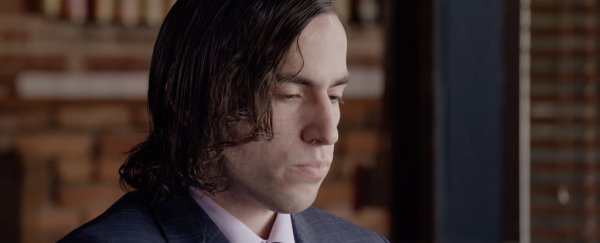The head of a biomedical company who recently earned fame for injecting himself with an untested gene therapy has been found deceased, according a report by the Washington DC Metropolitan Police Department.
While there is currently no word on the cause of 28 year old Aaron Traywick's death, the news draws fresh attention to his controversial work in a field known commonly as 'biohacking', and the potential risks of such low-cost DIY biological research.
Traywick's body was reportedly found face down in a sensory deprivation tank at SOULEX Float Spa in Washington DC at 11.31am on April 29.
Evidence of what caused his death is pending further investigation, but police have stated they have no reason to suspect foul play at this stage.
The biotech company Ascendance Biomedical hit news headlines in October last year when Traywick removed his trousers in front of an audience at a biohacking convention in Texas and injected his own thigh with a gene therapy intended to treat herpes.
Officially speaking, the treatment hadn't gone through the rigorous clinical testing required of new medications that can cost large sums of money and take years to reach an approval decision.
By nominating himself as guinea pig, Traywick planned to provide evidence of the genetic therapy's safety and efficacy while circumventing the Food and Drug Administration's strict regulations.
Colleagues at the biotech company have reported the CEO has recently distanced himself from Ascendance following conflict over the outfit's direction, telling Vice News, "We all lost touch with him. It was radio silence."
In spite of disagreements, the company issued a statement, saying, "While many in the biohacking scene disagreed with his methods, none of them doubted his intentions."
It's important to avoid speculating over potential connections between Traywick's death and his involvement in potentially risky medical experimentation.
Yet the news highlights the field of self-declared mavericks known as biohackers and the risks, benefits, and theatrics of activities they carry out.
Earlier this year, biophysicist Josiah Zaynor reflected on his own promotional stunts that aimed to draw public attention to DIY gene editing kits that made use of CRISPR technology.
"What it's turned into now, people view it as a way to get press and get publicity and get famous. And people are going to get hurt," Zaynor told Sarah Zhang from The Atlantic.
"There's no doubt in my mind that somebody is going to end up hurt eventually. Everybody is trying to one-up each other more and more."
History is full of scientific mavericks who gambled their health and lives on breakthroughs. We only need to flick through a text book to read such celebrated accounts of bravery and self-confidence.
Unfortunately it's a lot harder to quantify the number of rogues whose sacrifices went unrewarded with success, either due to poor luck or ignorance.
Time will tell whether Traywick will be remembered as a visionary of medical revolution or as a foolhardy biohacker.
As technology opens doors for more individuals to push boundaries in biology and medicine, we can expect to see more examples in both categories.
